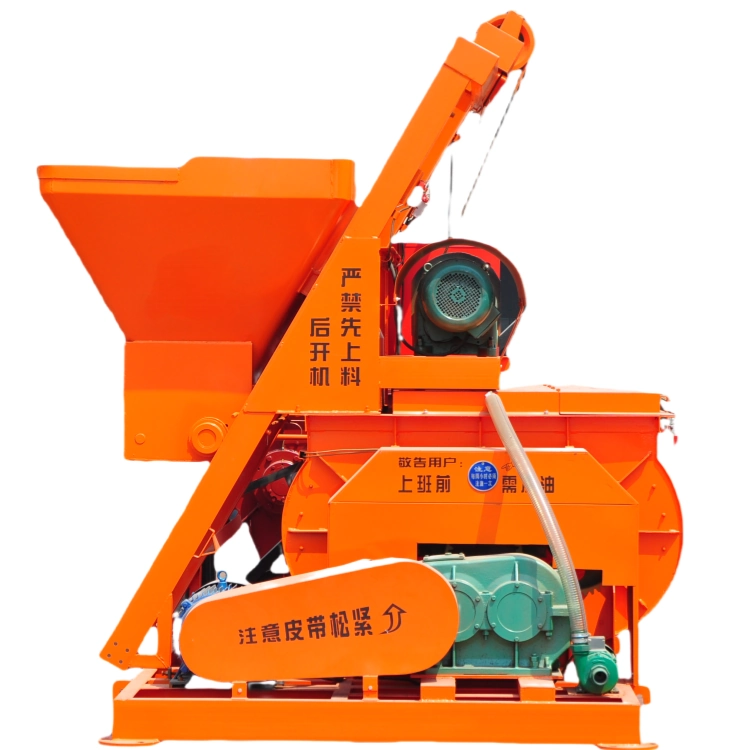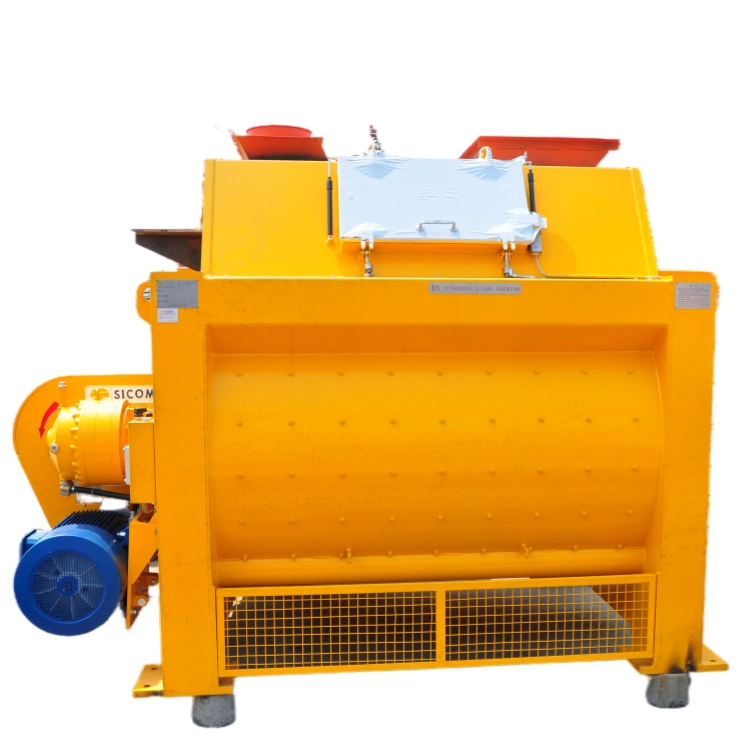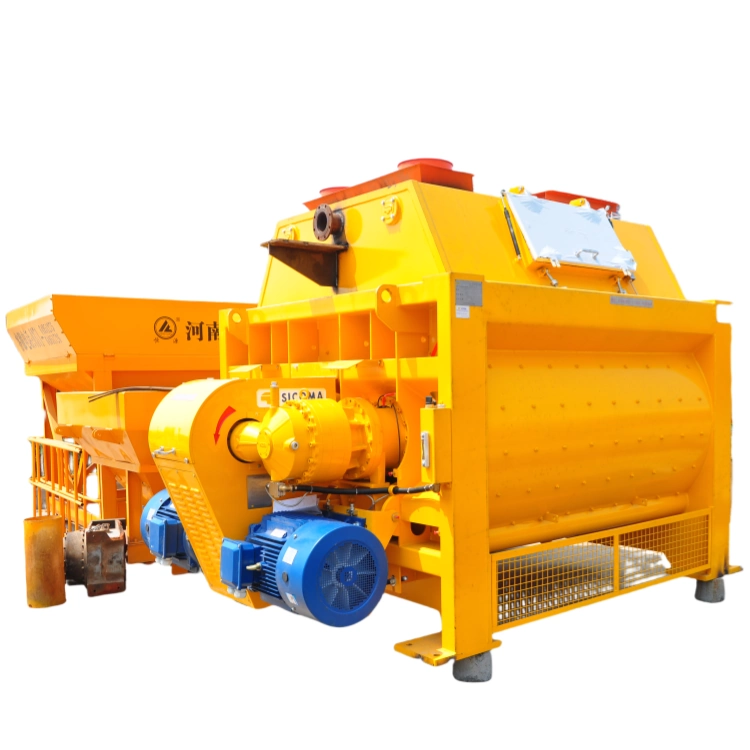
Large Concrete Mixer Machine
Belle Mixer Drum Self Loading Mortar Mixers JS3000
Item Number : JS3000
Price varies based on specs and customizations
- Discharging capacity
- 3000L
- Productivity (m3 /h )
- 180
- Mixing Blade Number
- 2x10
- Mixing Blade Rotate Speed
- 21r/min
Shipping:
Contact us to get shipping details Enjoy On-time Dispatch Guarantee.
Why Choose Us
Easy ordering process, quality products, and dedicated support for your business success.

Application
The JS3000 concrete mixer is a powerhouse in the construction industry, designed to meet the demands of large-scale projects that require high-performance concrete. Its applications span across various sectors, ensuring efficiency and quality in every pour.
-
Ultra-large construction projects: This mixer is indispensable in the construction of skyscrapers exceeding 600 meters, large commercial complexes, and industrial plants. It provides a stable and efficient supply of concrete for foundational and structural components, ensuring that the massive scale of these projects is supported with high-quality materials.
-
Large infrastructure projects: In the realm of infrastructure, the JS3000 is a go-to for projects like cross-sea bridges, high-speed railroads, and urban subway networks. It excels in mixing high-strength concrete, crucial for the durability and safety of structures such as bridge main towers and railroad track slabs.
-
Large-scale water conservancy and hydropower hubs: For projects like giant hydropower stations and extensive water transfer systems, this mixer is essential. It produces concrete with excellent seepage and freeze-thaw resistance, ideal for constructing dams, spillways, and other hydraulic structures.
-
Large-scale commercial concrete production bases: Serving as the core equipment in commercial concrete production, the JS3000 meets the high demand for various grades of concrete. It supplies numerous construction projects within cities and neighboring areas, ensuring a steady flow of quality materials.

Feature
The JS3000 concrete mixer is packed with features that set it apart in the market, designed to enhance performance and reliability in demanding construction environments.
-
Extra large mixing capacity: With a discharging capacity of up to 3 cubic meters, this mixer significantly reduces the number of mixing batches required, boosting production efficiency and meeting the high demand for concrete in large-scale projects.
-
High-efficiency mixing technology: Utilizing advanced double horizontal shaft forced mixing technology, the mixer ensures a strong three-dimensional mixing flow. This results in uniform mixing in a short time, producing high-quality concrete consistently.
-
Advanced control system: Equipped with a high-precision intelligent control system, the JS3000 allows for precise material measurement and automated mixing operations. This ensures accurate concrete mixing ratios, stable quality, and reduced labor costs.
-
High abrasion resistance and durability: Key components like the mixing drum and blades are made from high-strength, abrasion-resistant alloy materials. These components undergo special heat treatment, enhancing their resistance to wear and corrosion, which is crucial for long-term, high-intensity operations.
-
Environmental protection and energy-saving design: The mixer includes an efficient dust collection system and a waste water recycling device, reducing environmental impact. Additionally, optimized motor power and transmission systems lower energy consumption, promoting sustainable production practices.
Principle
The JS3000 concrete mixer operates on principles that ensure efficiency, quality, and reliability in concrete production.
-
Double horizontal shaft forced mixing technology: This technology involves two horizontal shafts with specially designed mixing blades that rotate in opposite directions. This creates a strong three-dimensional mixing flow, ensuring that all materials are uniformly mixed in a short period.
-
Intelligent control system: The mixer’s control system uses high-precision sensors and automated algorithms to measure and control the mixing process. This ensures that each batch of concrete meets the specified mixing ratio and quality standards.
-
Material flow optimization: The design of the mixing drum and blades is optimized to facilitate the smooth flow of materials. This minimizes resistance and ensures that the mixing process is efficient and thorough.
-
Energy-efficient operation: The motor and transmission systems are designed to minimize energy consumption. This is achieved through optimized power usage and reduced mechanical losses, contributing to lower operational costs and environmental impact.
Advantage
The JS3000 concrete mixer offers numerous advantages that make it a preferred choice for large-scale construction projects.
-
High productivity: With its large mixing capacity and efficient mixing technology, the JS3000 significantly boosts productivity. It reduces the number of mixing batches required, allowing for faster completion of large-scale projects.
-
Superior mixing quality: The advanced mixing technology ensures that concrete is uniformly mixed, resulting in high-quality output. This is crucial for the structural integrity and durability of construction projects.
-
Precision and automation: The intelligent control system allows for precise measurement and automated mixing operations. This ensures consistent quality and reduces the need for manual intervention, lowering labor costs.
-
Durability and reliability: The use of high-strength, abrasion-resistant materials in key components ensures that the mixer can withstand long-term, high-intensity operations. This reduces maintenance needs and extends the equipment’s service life.
-
Environmental sustainability: The mixer’s dust collection and waste water recycling systems minimize environmental impact. Additionally, its energy-efficient design reduces energy consumption, aligning with sustainable production practices.

Technical specifications
| Applications | Description |
|---|---|
| Ultra-large construction projects | Provides efficient and stable concrete supply for skyscrapers over 600 meters, large commercial complexes, and industrial plants. Meets demands for foundation and main structure concrete pouring. |
| Large infrastructure projects | Used in cross-sea bridges, high-speed railroads, and urban subway networks. Mixes high-performance, high-strength concrete for bridge main towers, railroad track slabs, and other structural components. |
| Large-scale water conservancy projects | Mixes concrete with excellent seepage and freeze-thaw resistance for dams, spillways, and other hydraulic structures in hydropower stations and water transfer projects. |
| Commercial concrete production base | Serves as core equipment for large-scale commercial concrete production, providing various grades and performance requirements for urban and neighboring construction projects. |
| Selling Points | Description |
|---|---|
| Extra large mixing capacity | Discharging capacity up to 3 cubic meters, high hourly output, reduces mixing batches, improves production efficiency, and meets large concrete demands. |
| High-efficiency mixing technology | Uses double horizontal shaft forced mixing technology and optimized blade/cylinder design for strong three-dimensional mixing flow, ensuring uniform and high-quality concrete. |
| Advanced control system | Equipped with high-precision intelligent control for precise material measurement, automated mixing, stable concrete quality, improved efficiency, and reduced labor costs. |
| High abrasion resistance and durability | Key components made of high-strength, abrasion-resistant alloy materials with special heat treatment, ensuring long service life and adaptability to high-intensity operations. |
| Environmental protection and energy-saving | Includes efficient dust collection and wastewater recycling systems, reduces dust emissions and water waste, optimizes motor power and transmission for energy-efficient production. |
FAQ
What Are The Main Applications Of Concrete Mixers?
What Are The Main Applications Of Mixing Concrete Mixers?
What Is The Principle Of A Construction Mixer Machine?
What Are The Common Applications Of Portable Cement Mixers?
What Is A Mobile Concrete Mixer?
What Are The Main Applications Of Mud Mixer Cement Mixers?
What Are The Main Applications Of Hydraulic Concrete Mixers?
What Is A Mini Cement Mixer Used For?
What Are The Different Types Of Concrete Mixers Available?
What Are The Key Features Of A Mixing Concrete Mixer?
What Are The Advantages Of Using A Construction Mixer Machine?
What Are The Benefits Of Using A Portable Cement Mixer?
What Are The Main Applications Of A Mobile Concrete Mixer?
What Are The Main Components Of A Cement Mixer?
What Are The Key Features Of Hydraulic Concrete Mixers?
What Are The Key Benefits Of Using A Mini Cement Mixer?
How Does A Concrete Mixer Work?
How Does A Batch Mixer Work?
What Are The Common Applications Of Construction Mixer Machines?
What Features Should I Look For In A Portable Cement Mixer?
How Does A Mobile Concrete Mixer Work?
What Are The Advantages Of Using A Cement Mixer?
How Does A Hydraulic Concrete Mixer Work?
What Materials Can A Mini Cement Mixer Handle?
What Are The Advantages Of Using A Concrete Mixer?
What Is The Principle Behind A Volumetric Concrete Mixer?
What Types Of Construction Mixer Machines Are Available?
What Are Some Tips For Using A Portable Cement Mixer Effectively?
What Are The Advantages Of Using A Mobile Concrete Mixer?
What Types Of Cement Mixers Are Available?
What Are The Advantages Of Using Hydraulic Concrete Mixers?
How Does A Mini Cement Mixer Work?
What Should I Consider When Choosing A Concrete Mixer?
What Are The Advantages Of Using A Mixing Concrete Mixer?
How Does A Construction Mixer Machine Improve Construction Efficiency?
What Are The Advantages Of Owning A Portable Cement Mixer?
What Types Of Projects Are Best Suited For Mobile Concrete Mixers?
How Does A Cement Mixer Work?
What Types Of Projects Are Hydraulic Concrete Mixers Suitable For?
What Are The Advantages Of Owning A Portable Mini Cement Mixer?
Are There Portable Concrete Mixers Available?
How Does A Concrete Mixer Benefit The Environment?
What Types Of Materials Can A Portable Cement Mixer Handle?
How Does A Mobile Concrete Mixer Improve Efficiency?
What Should I Consider When Choosing A Cement Mixer?
Are Mini Cement Mixers Cost-effective?
What Is The Capacity Range Of Concrete Mixers?
What Types Of Projects Are Portable Concrete Mixers Suitable For?
How Does A Portable Cement Mixer Save Time?
What Features Should I Look For In A Mobile Concrete Mixer?
Are Cement Mixers Suitable For DIY Projects?
Can Mini Cement Mixers Be Transported Easily?
Can Concrete Mixers Be Used For Other Materials Besides Concrete?
What Should I Consider When Choosing A Concrete Mixer For Large-scale Projects?
Why Is Portability An Important Feature In Cement Mixers?
Are Mobile Concrete Mixers Cost-effective?
Can Cement Mixers Handle Different Types Of Concrete Mixes?
How Does A Mini Cement Mixer Improve Work Efficiency?
What Maintenance Is Required For A Concrete Mixer?
What Should I Consider When Choosing The Capacity Of A Portable Cement Mixer?
What Maintenance Is Required For A Cement Mixer?
Are There Eco-friendly Concrete Mixers Available?
How Does A Portable Cement Mixer Enhance Cost-effectiveness?
How Do I Ensure Safety When Using A Cement Mixer?
4.8 / 5
This mixer is a game-changer! Fast delivery and excellent quality. Highly recommend!
4.7 / 5
Impressive durability and advanced technology. Worth every penny!
4.9 / 5
Perfect for large projects. Efficient, reliable, and easy to use. Love it!
4.8 / 5
Great value for money. The self-loading feature is a huge time-saver!
4.7 / 5
Top-notch quality and fast delivery. This mixer exceeded my expectations!
4.9 / 5
Technologically advanced and highly durable. A must-have for construction!
4.8 / 5
Speedy delivery and excellent performance. This mixer is a real asset!
4.7 / 5
Superior quality and great value. The self-loading feature is fantastic!
REQUEST A QUOTE
Our professional team will reply to you within one business day. Please feel free to contact us!
Related Products

Harbor Freight JS1500 On Site Concrete Mixing Volumetric Cement Mixer
Discover the JS1500 harbor freight cement mixer for large-scale construction and hydraulic projects. High-capacity, efficient, and eco-friendly.

HZS25 Best Cement Mixer for Quick Mix Concrete at Bunnings
Discover the best cement mixer for small to medium construction projects. High productivity, precise batching, compact design. Ideal for versatile applications.

Commercial Electric Concrete Mixer Machine HZS 50 Small Batch Plant for Sale
Discover high-quality concrete mixer machines and batch plants for construction, road, and precast projects. Efficient, precise, and user-friendly.

HZS75 Concrete Batching Plant Cement Mixer Price Concrete Mixer Bunnings Mixing Plant
Optimize your construction projects with the HZS75 concrete batching plant—high efficiency, precise mixing, and automated control for superior results.

HZS120 Ready Mix Concrete Batching Plant Commercial Mud Cement Mixer
HZS120 concrete batching plant: High productivity, precise mixing, automation, and eco-friendly design for large-scale construction projects.

HZS90 Large Multiquip Concrete Mixers for Construction
Discover the HZS90 concrete mixer, ideal for large-scale construction, road, and hydropower projects. High efficiency, precise mixing, and easy installation. Learn more now!

HZS180 Ready Mix Concrete Plant for Foundations with Sand and Cement
Optimize your construction projects with our ready mix concrete plant. High efficiency, precise measurement, and advanced automation ensure top-quality concrete for large-scale builds. Explore now!

HZS35 Small Cement Concrete Mixing Batch Plant
Optimize your construction projects with our efficient small concrete batch plant. High-quality mixing, precise measurement, and durable design ensure reliable concrete production for diverse applications. Explore now!
Related Articles

How Radial Runout Tolerance Shapes Mixer Performance and Durability
Learn how radial runout tolerance impacts mixer performance, maintenance tips, and failure prevention strategies for optimal efficiency and durability.

Beyond Gravity: The Engineering of a Perfect Concrete Pour
Discover how self-loading mixers use reversed blade rotation and precise tilting to control concrete discharge, moving beyond gravity for superior accuracy.

Beyond the Revolution Count: The Physics and Psychology of Perfect Concrete
Discover why the 50-100 revolution spec for PCC mixing is a means to an end. The real goal is homogeneity, and where you mix dictates the process.

How Cement Mortar Mixing Plants Achieve Sustainable Construction Through Pollution Control and Resource Efficiency
Discover how modern cement mortar mixing plants reduce emissions by 30% with closed-loop systems, smart resource management, and noise control technologies.

Gravity's Grasp: The Physics and Psychology of Choosing a Concrete Mixer
Discover the engineering trade-offs of drum concrete mixers and how to choose between cost, speed, and consistency for your construction project.

Scaling Down: The Engineering Elegance of the Right-Sized Concrete Mixer
Choosing a concrete mixer isn't about power, but precision. Learn why drum mixers excel for small projects and when to skip a mixer entirely.

The Precision Mandate: How Self-Loading Mixers Ended the Guesswork in Concrete
Discover how automatic weighing systems in self-loading mixers use sensors and data to eliminate human error, ensuring every concrete batch meets exact specs.

The One-Machine Revolution: Deconstructing the Physics and Psychology of On-Site Concrete Production
Discover how self-loading concrete mixers are not just machines, but systems that reduce cognitive load and logistical friction on construction sites.

Concrete is a System, Not a Substance: Deconstructing the Self-Loading Mixer
A self-loading mixer is an integrated system. Its value lies not in a single part, but in how its weighing, mixing, and mobility systems work in concert.

The Physics of a Faster Pour: Why Bucket Shape Defines Concrete Mixer Productivity
Discover how the rounded bucket on a self-loading mixer is a critical engineering design that minimizes waste and boosts on-site productivity.

The Two-Speed Heartbeat of Modern Construction: Why Concrete Drum Rotation Isn't Simple
The difference between high-speed mixing and low-speed agitation in a concrete drum dictates structural integrity. It's a game of controlled physics.

The Unseen Guardian: How Redundant Braking Tames Heavy Machinery
Discover how redundant, dual-circuit brake systems in heavy machinery like self-loading mixers provide fail-safe control, not just stopping power.